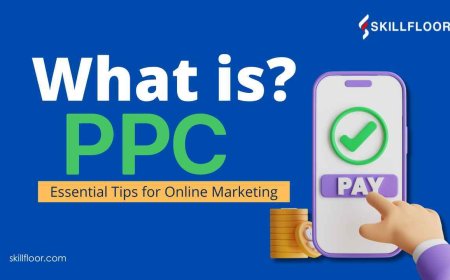What Is Influencer Marketing in Digital Marketing
Explore the world of influencer marketing in digital marketing. Learn how this powerful strategy can boost brand visibility and engagement.

Influencer marketing is a way for brands to partner with popular online personalities, or "influencers," to promote their products or services. These influencers have a large and engaged following on social media platforms like Instagram, YouTube, and TikTok. They can be trusted by their audience, which makes their recommendations valuable to businesses.
This type of marketing has become really important in the digital world. It helps companies reach a wider audience in a more authentic way. When influencers talk about a product, it feels like a friend's recommendation rather than a traditional advertisement. This builds trust and credibility.
In recent years, influencer marketing has grown tremendously. More and more people are using social media, and influencers play a big role in shaping trends and opinions. Brands have noticed this and are investing in influencer partnerships to promote their products. This growth shows how effective and influential these collaborations can be.
So, influencer marketing is about teaming up with popular online personalities to spread the word about products. It's significant because it helps companies reach more people in a trustworthy and authentic way. And it's been growing a lot lately, reflecting its increasing importance in the digital marketing landscape.
Challenges and issues associated with influencer marketing
In the world of influencer marketing, there are some challenges and issues that businesses need to navigate. These complications can make it a bit tricky, but with the right approach, they can be overcome.
First, there are authenticity concerns. Sometimes, influencers might promote products that they don't actually use or believe in. This can make the marketing feel fake, and savvy consumers can spot that. So, it's important for brands to ensure that their partnerships with influencers are based on genuine enthusiasm for their products.
Choosing the right influencers is another challenge. With so many influencers out there, it can be tough to find the perfect match for a brand. Picking someone who genuinely connects with your target audience is crucial. Just having a big following isn't enough; it's about finding the right fit.
Measuring return on investment (ROI) can be a bit complex. Businesses want to know if their influencer marketing efforts are paying off. But it's not always easy to track the direct impact on sales or brand awareness. Setting clear goals and using tracking tools can help here.
Lastly, there are legal and ethical considerations. It's essential for both brands and influencers to follow the rules and regulations in the marketing world. Things like disclosure of paid partnerships and respecting copyrights are essential to maintain trust with the audience.
So, while influencer marketing can be highly effective, it's not without its challenges. Authenticity, choosing the right influencers, measuring ROI, and adhering to legal and ethical standards are the main complications. Overcoming these hurdles requires a thoughtful and strategic approach to ensure successful influencer marketing campaigns.
What are the key principles of influencer marketing?
Principles of influencer marketing
Relevance:
In influencer marketing, relevance is key. It means that the influencer you choose should be a natural fit for your brand or product. If their content and style align with your target audience, it makes the partnership feel more genuine. Think of it like this: if you're promoting fitness gear, working with a fitness influencer who regularly shares workout tips and healthy living advice makes sense. Their followers are already interested in that topic, making them more likely to be interested in your product.
Authenticity:
Authenticity is a big deal in influencer marketing. It means that the influencer should truly use and believe in your product. When influencers genuinely endorse a product, it comes across as real, and their audience is more likely to trust their recommendation. If it feels forced or insincere, it can turn people off. So, it's important to ensure that the influencer genuinely connects with what you're offering.
Audience Understanding:
For influencer marketing to work, the influencer needs to know their audience inside out. This helps them create content that resonates with their followers and makes the product more relatable. The influencer understands what their audience likes, what problems they face, and what they find interesting. When they tailor the content to meet these preferences, it's more likely to connect with the audience.
Transparency:
Transparency means being open and honest about the partnership. It's important for the influencer to tell their followers that they're working with your brand. This builds trust. When people know that an influencer is being paid to promote a product, they can weigh the recommendation more accurately. Transparency helps maintain authenticity and trust, which are essential in influencer marketing.
Quality Content:
Influencers are content creators, and the quality of the content they produce matters. Good visuals, engaging storytelling, and clear communication are vital. The content should be eye-catching and compelling. When it's well-crafted, it captures the audience's attention and keeps them interested.
Long-term Relationships:
Building long-term relationships with influencers can be more beneficial than one-off campaigns. These relationships create a sense of trust and continuity with the audience. When an influencer consistently promotes your products over time, it reinforces the association between the influencer and your brand in the minds of their followers.
Measurable Goals:
For influencer marketing to be effective, it's important to set clear goals. What do you want to achieve with the campaign? Is it about boosting sales, increasing brand awareness, or engaging with a new audience? When you have specific objectives in mind, it's easier to measure the success of the campaign.
The principles of influencer marketing are all about ensuring that the partnership is relevant, authentic, and focused on the audience. Transparency and quality content are crucial, while building long-term relationships with influencers and setting measurable goals help maximize the impact of influencer marketing efforts.
How can businesses effectively leverage influencer marketing in their digital marketing strategies?
Strategies for businesses in influencer marketing
-
Identify the Right Influencers: Find influencers whose values, content, and audience align with your brand. Look for influencers who have a genuine connection with your target demographic.
-
Set Clear Objectives: Decide what you want to achieve with the campaign. Is it about boosting sales, increasing brand awareness, or engaging with a new audience? Having clear objectives guides the campaign.
-
Collaborative Content Creation: Work closely with the influencer to create content that showcases your product naturally. Give them creative freedom while ensuring that your brand message is intact.
-
Transparency: Ensure influencers disclose their paid partnerships. It's not just a legal requirement but also builds trust with the audience.
-
Promote on Multiple Platforms: Use various social media platforms to reach a broader audience. Different platforms work better for different types of products and audiences.
-
Engagement and Interactivity: Encourage influencers to interact with their audience through polls, Q&A sessions, or live videos. This builds a stronger connection and keeps the audience engaged.
-
Analytics and Measurement: Use analytics tools to track the performance of the campaign. Measure the impact on metrics like engagement, website traffic, and sales.
-
Feedback and Adaptation: Continuously collect feedback and adapt your influencer marketing strategy. What worked and what didn't? Learning from each campaign improves future efforts.
Metrics for Measuring Influencer Marketing Success
In the world of influencer marketing, knowing how to measure success is crucial. It helps businesses determine whether their efforts are paying off and guides future strategies. Let's break down the key metrics that are used to evaluate the effectiveness of influencer marketing campaigns.
Engagement Metrics: One of the primary indicators of success in influencer marketing is engagement. This includes likes, comments, shares, and overall interactions on the influencer's posts. These metrics show how well the content resonates with the audience. The more engagement, the more likely it is that the campaign is connecting with people.
Reach and Impressions: Reach measures how many people have seen the influencer's content. Impressions count how many times the content was displayed. High reach and impressions indicate that the campaign has gained significant exposure. This is essential for brand visibility.
Follower Growth: An increase in the influencer's followers during and after a campaign can be a positive sign. It suggests that the audience found the content compelling and decided to follow the influencer for more updates. This can translate into a broader audience for your brand.
Click-Through Rate (CTR): If the goal of the campaign is to drive traffic to your website or a specific landing page, CTR is a vital metric. It tells you how many people clicked on the link provided by the influencer. A high CTR indicates that the audience is interested in learning more about your product or service.
Conversion Rates: Ultimately, the most crucial metric for many businesses is conversion rates. This metric tells you how many people who interacted with the influencer's content went on to make a purchase or take the desired action. A high conversion rate means that the campaign is not only engaging but also driving results.
Return on Investment (ROI): ROI is a critical metric for assessing the financial success of your influencer marketing campaign. It involves comparing the revenue generated from the campaign to the costs, including payments to the influencer and campaign expenses. A positive ROI indicates that the campaign was profitable, while a negative one suggests that adjustments may be needed.
Brand Sentiment and Awareness: Measuring changes in how people perceive your brand is essential. This can be done by analyzing the sentiment of comments and mentions related to your brand after the campaign. Increased brand awareness and a positive sentiment shift are valuable outcomes, as they can lead to increased trust and loyalty.
Customer Feedback: Listening to what your customers are saying about your brand and the influencer marketing campaign can provide valuable insights. Collect feedback through surveys, social media listening tools, or direct customer interactions. Understanding how the audience perceives the campaign and the impact on their buying decisions can help shape future strategies.
Customer Lifetime Value (CLV): For long-term success, consider the CLV of customers acquired through influencer marketing. This metric looks at the revenue generated by a customer throughout their relationship with your brand. If influencer-acquired customers have a high CLV, it indicates that the campaign is not just bringing in new customers but also fostering lasting relationships.
Content Quality: Don't overlook the quality of content created by the influencer. Well-crafted content not only engages the audience but also reflects positively on your brand. Assess the aesthetics, storytelling, and overall appeal of the content.
Influencer marketing is a powerful tool in the digital marketing toolkit. It connects brands with engaged audiences through trusted influencers. When done right, it can boost brand visibility, engagement, and sales. However, it's vital to remember that success lies in authenticity and choosing the right influencers. Also, adapting to changing trends and maintaining ethical practices is key. With careful planning and genuine collaborations, influencer marketing can be a game-changer for businesses, creating meaningful connections with their target audience. Keep in mind, it's not just about the partnership, but about building lasting relationships that benefit both the brand and the influencer's audience.





























































